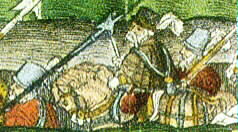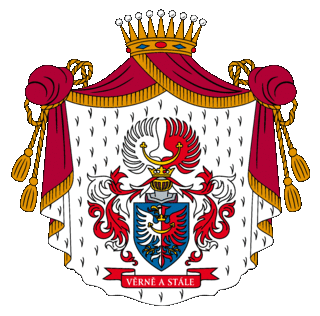
Albrecht III was Elector of Brandenburg from 1471 until his death, the third from the House of Hohenzollern. A member of the Order of the Swan, he received the cognomen Achilles because of his knightly qualities and virtues. He also ruled in the Franconian principalities of Ansbach from 1440 and Kulmbach from 1464.
Year 1442 (MCDXLII) was a common year starting on Monday of the Julian calendar.

George of Kunštát and Poděbrady, also known as Poděbrad or Podiebrad, was the sixteenth King of Bohemia, who ruled in 1458–1471. He was a leader of the Hussites, but moderate and tolerant toward the Catholic faith. His rule was marked by great efforts to preserve peace and tolerance between the Hussites and Catholics in the religiously divided Crown of Bohemia – hence his contemporary nicknames: "King of two peoples" and "Friend of peace".

Jindřichův Hradec is a town in the South Bohemian Region of the Czech Republic. It has about 21,000 inhabitants. The historic town centre is well preserved and is protected by law as an urban monument reservation.

Elizabeth of York, Duchess of Suffolk also known as Elizabeth Plantagenet was the sixth child and third daughter of Richard Plantagenet, 3rd Duke of York and Cecily Neville. She was thus a sister of kings Edward IV and Richard III.

Henry IV of Plauen, was High Chancellor of the Kingdom of Bohemia, Burgrave of Meissen, Lord of Plauen, Gera, Greiz, Schleiz and Bad Lobenstein, Lord of Toužim, Hartenštejn Castle, Andělská Hora Castle and Žlutice. He also used the traditional title of Lord of Lázně Kynžvart and, apart from an intermezzo in 1547, he was Lord of Bečov nad Teplou as well.
Victor, Duke of Münsterberg also: Victor, Duke of Münsterberg and Opava; Czech: Viktorin z Minsterberka; was an Imperial Count from 1459 and Count of Kladsko. From 1462 until his death, he was Duke of Münsterberg, and from 1465 to 1485 Duke of Opava.

The Bohemian Poděbrady family was a noble family in Bohemia, arising from the Lords of Kunštát. After Boček of Kunštát had acquired the Lordship of Poděbrady by marriage, he called himself "Boček of Kunštát and Poděbrady". The most prominent member of the family was George of Poděbrady, who was king of Bohemia. His sons were raised to imperial counts and Counts of Glatz. They founded the Silesian branch of the family, the Dukes of Münsterberg.
Henry the Younger of Poděbrady was an Imperial Count and Count of Glatz. From 1462 to 1471, he served as Duke of Münsterberg jointly with his older brothers Victor and Henry the Elder. He also ruled Duchy of Opava jointly with his brothers from 1465 to 1472. Henry the Younger, held at times the office of regent of Bohemia and is also known as an author.
Vilém II of Pernštejn was a Czech nobleman. He held the office of High Treasurer of Moravia from 1474 to 1487. He was High Marshall of Bohemia from 1483 to 1490 and Lord Chamberlain of Bohemia from 1490 to 1514.
John II of Rosenberg was a member of the House of Rosenberg. He was governor (Landeshauptmann) of Silesia, and High Chamberlain in Bohemia.

The Lordship of Homole is a historic landscape zone in the western part of Kłodzko Land in Poland, formerly part of the County of Kladsko, Bohemia.

Menhart z Hradce, was one of the leaders of the moderate Utraquists from 1437 onwards, and was colonel of burgrave of Bohemia. He was a member of the Hradec family, a branch of the Vítkovci dynasty.

John II, Duke of Troppau was a Duke of Silesia from the Opava branch of the Přemyslid dynasty. He was co-ruler of the Duchy of Opava from 1445/1457 to 1464 and of the Duchy of Głubczyce from 1445/1457 until his death.

Vojtěch I of Pernštejn was a Bohemian nobleman, member of the Pernštejn family. He was High Hofmeister of Bohemia from 1514 to 1523 and from 1526, he was governor of Bohemia. He was considered one of the richest magnates in Bohemia.
Wenceslaus III, Duke of Rybnik was co-ruler of Krnov from 1452 to 1464 and the sole ruling Duke of Rybnik from 1464 to 1474. He was a member of the Opava-Ratibor branch of the Přemyslid dynasty.

Czech Renaissance architecture refers to the architectural period of the early modern era in Bohemia, Moravia and Czech Silesia, which then comprised the Crown of Bohemia and today constitute the Czech Republic. The Renaissance style flourished in the Czech lands from the late 15th century to the first half of the 17th century.

The St. Vitus Madonna comes from the treasure of St. Vitus Cathedral in Prague and is exhibited in its original frame in the permanent collection of the National Gallery in Prague.

The House of Kolowrat is a Czech noble family that had a prominent role in the history and administration of their native Kingdom of Bohemia as well as the Holy Roman Empire and later the Habsburg monarchy as high-ranking officials and supporters of the Czech National Revival.












